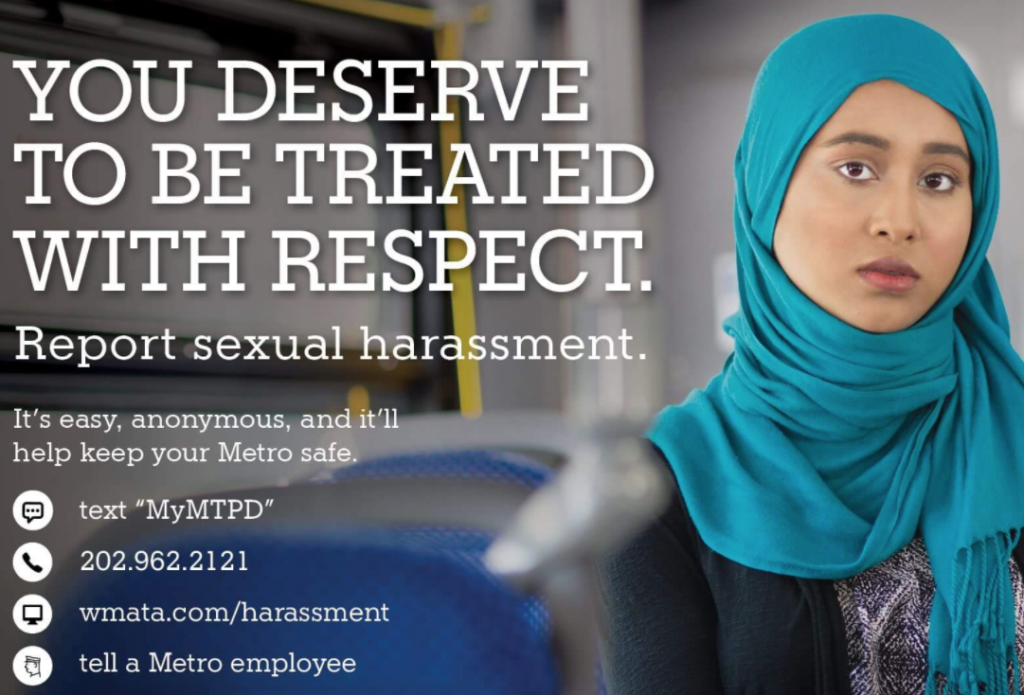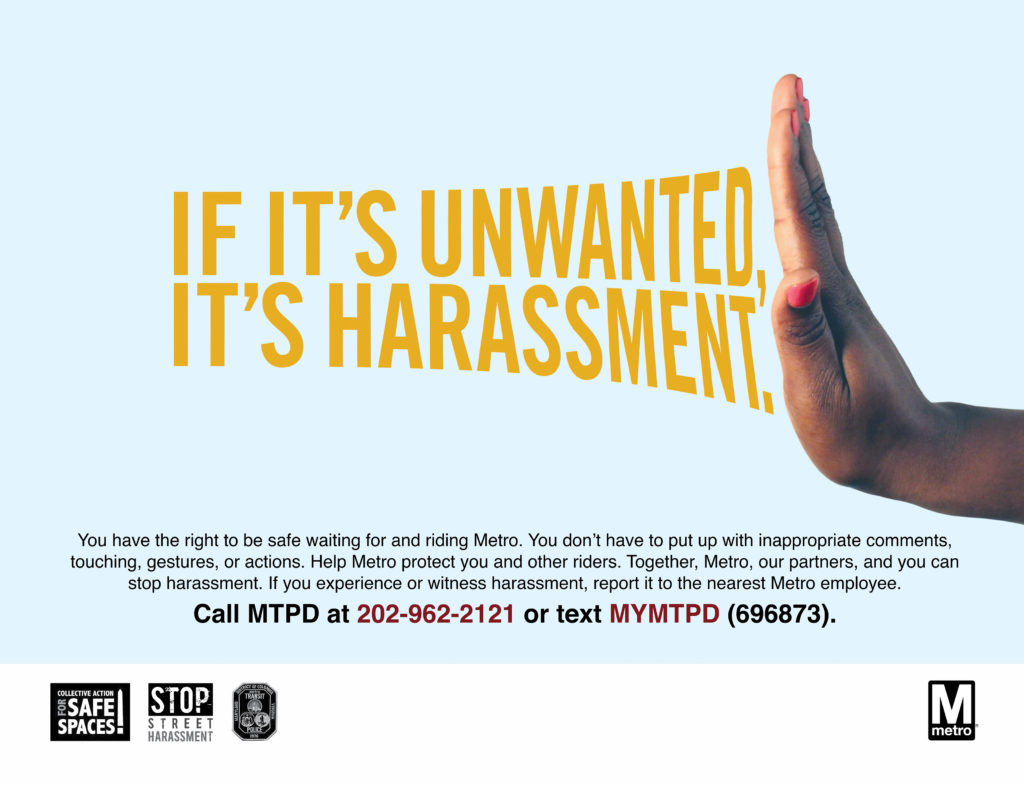“The changes that Metro is making to address public sexual harassment and assault is a testament to the hundreds of stories we received on our site. We see this partnership as a step in the right direction and a model for other transit agencies around the world to follow.”
— Chai Shenoy, co-founder, Collective Action for Safe Spaces
In February 2012, Collective Action for Safe Spaces began an official campaign for the Washington Metropolitan Area Transit Authority (WMATA) to implement policy to address sexual harassment and assault on the DC metro. By April 2012, WMATA responded by introducing its first-ever public awareness campaign to combat sexual harassment of customers while using the system. Below, here is a reverse timeline of our ongoing relationship.
Meeting with WMATA
January 8, 2018
We met with WMATA to plan next steps for the campaign against sexual harassment on public transit. With Stop Street Harassment, we recorded audio versions of our Metro ads, and now we’re working toward gathering data to ensure that these measures are working.
New Awareness Campaign Addresses Spike in Reports of Harassment Across DC
November 10, 2016

After a spike in reports of harassment across our city — especially targeting people of color, LGBTQ and gender nonconforming people, and people who are part of multiple marginalized groups, the new awareness campaign has three goals: Support people who experience harassment with messages letting riders know they deserve to be treated with respect. Promote a culture of bystander intervention, where everyone is responsible for speaking out against harassment and making public transit safer. Elevate our city’s most marginalized identities by featuring the faces of people who are part of marginalized groups, such as trans women of color and Muslim women, who face harassment most severely and most frequently.
WMATA Releases Findings from DC’s First Transit Safety Survey
April 12, 2016
We worked with Stop Street Harassment and WMATA to conduct one of the first-ever comprehensive transit safety surveys in the country to learn more about transit riders’ experiences with harassment on DC’s public transit and what we can do to help.
Second Round of Anti-sexual Harassment PSA
February 24, 2015

Following months of collaboration with CASS and Stop Street Harassment, WMATA releases its second round of anti-sexual harassment PSAs since the Anti-Sexual Harassment Campaign was established in 2012. The PSAs differ from the first round in that they use gender neutral language and in part address perpetrators of sexual harassment, rather than just those who are harassed.
CASS Testified at the DC Council’s Performance Oversight Hearing on WMATA
March 18, 2013
Julia Strange, Director of Programs and Policy, testified on behalf of CASS at the DC Council’s performance oversight hearing on the Washington Metropolitan Area Transit Authority’s (WMATA). Julia addressed the agency’s handling of sexual harassment and assault on public transit, an issue that CASS first shed light on in February 2012 when we, along with other local activists and survivors, testified on the importance of strengthening WMATA’s response to sexual harassment and assault on public transit.
Pushing to Make DC Metro Free of Public Sexual Harassment and Assault
February 22, 2013
While we are excited that WMATA is committed to moving forward, we did ask — and are continuing to ask — questions to hold the agency accountable. For example: Why have trainings for WMATA employees still not been implemented? We realize that these processes are hard, but we must push ahead after a year of hard work. How can WMATA increase reporting of these crimes knowing that one bad reaction causes several people to remain silent because they think the agency won’t care? Where are the hot spots? What trends have been identified in the past year, and how can MTP respond to them?
CASS and Stop Street Harassment Meet with WMATA on Global Day of Action for Safer Cities
February 20, 2013
CASS staff and Stop Street Harassment founder Holly Kearl met with key staff at WMATA, including deputy chief of employee communications and the lead for WMATA’s task force on addressing sexual harassment. This meeting was to discuss what has been achieved over the past year and to discuss what we can do during the second year to continue to address the issue.
Ads Displayed at 18 Metro Stations
June 8, 2012
Ads instructing metro-goers on how to report incidents of sexual harassment are displayed at 28 metro stations. The new posters, fliers and handouts (in both English and Spanish), are intended to raise awareness about the issue of sexual harassment in public spaces and encourage victims to report incidents to police. Metro Transit Police continue unprecedented tracking of all reports of sexual harassment incidents – even those that do not rise to the level of a crime. The collected data will be used to identify trends and deploy officers as necessary, and will be reported publicly to Metro’s Board of Directors on a quarterly basis.
WMATA’s Anti-Sexual Harassment Campaign
April 3, 2012
The first phase of WMATA’s Anti-Sexual Harassment Campaign is launched. The campaign included an online portal for individuals to report incidents to Metro Transit Police, along with improved data tracking of incidents. Metro also established an email address to allow victims to send photo or video files to assist an investigation.
DC Council Performance Oversight Hearing
February 19, 2012
We attended the February 22nd DC Council Performance Oversight Hearing on WMATA to Recommend How to Prevent Sexual Harassment and Assault. CASS — accompanied by private citizens and street harassment expert, Holly Hearl — testified about public sexual harassment and assault that occurs on the transit system. Our testimony stemmed from hundreds of incidents of public sexual harassment the group collected over three years — at least 30% of which took place on or around transit stations, trains, buses or bus stops.
